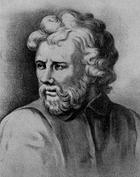RE&CBT:
In 1955 American Psychologist Albert Ellis initiated the approach. Since then it keeps developing continously to this very day.
Initially Albert Ellis critically questioned the more passive theories of psychoanalysis. In his quest for a more efficient form of therapy, he was mainly influenced by the Stoic Philosophers Epictetus, Seneca and Marcus Aurelius.

“It’s not the things that cause us suffering, but the opinion we have about these things.” (Epictetus)
Apart from Stoicism also Western philosophers such as Kant, Spinoza and Schoppenhauer, the linguist Alfred Korzybski and numerous psychologists such as Karen Horney, Alfred Adler, John Watson, Joseph Wolpe and Carl Rogers enriched with their approaches Albert Ellis’ thinking.
The basic idea of RE&CBT is that the goal of human beings is to minimize their suffering and maximize their happiness. According to the RE&CBT philosophy, people are happiest when they set important goals (but above all realistic, achievable and meaningful ones) and then actively strive to achieve them.
The approach works on the premise of learning theory:
“If you suffer, you likely haven’t learned yet how to free yourself from suffering and then don’t suffer anymore.”
Due to this it is a lot more a learning experience, that first is to be understood and then implemented, which makes it one of the most pragmatic and efficient approaches of psychotherapy.
RE&CBT is a scientifically proven approach based on empirical research and findings in cognitive and evidence-based psychology.
It is confirmed in its e ectiveness and is used for a variety of problems:
– Mood disorders (unipolar and bipolar depression, burn out syndrome)
– Anxiety disorders (panic disorder, phobias, generalized anxiety disorder, obsessiv compulsive disorder, post-traumatic stress disorder)
– Addictions (alcohol, drugs, substance abuse)
– Impulse control disorders
– Eating disorders
– Secondary emotional problems (shame, guilt, envy, jealousy, self-pity, self-hate)
– Personality disorders (narcissism, passive-aggressive personality disorder, schizoid and schizophrenic personality disorder, etc.)
RE&CBT is also used successfully in numerous other fields:
– Problems in partnership, family
– Problems in buisness and Job
– Issues in school and upbringing (e.g. Trauma)
– Developmental problems in children and adolecents
– Prevention and therapy of chronic stress or pathological anger